
12 Best Website Builder Platforms for UK Businesses (2025)
0
32
1
Building a professional website no longer requires a deep understanding of code or a massive budget. The challenge today is choosing from the vast array of available tools. This guide is designed to cut through the noise, offering a detailed comparison of the best website builder platforms to help you make an informed decision for your specific needs. Whether you're a small business owner launching an online shop, a freelancer showcasing a portfolio, or an entrepreneur testing a new idea, the right platform is critical for your success.
We will analyse each builder's core features, pricing structures, and ideal use cases, providing a clear, honest assessment of their strengths and limitations. This resource goes beyond surface-level reviews, offering practical insights into what it's like to actually use these tools. Each entry includes screenshots and direct links to help you visualise the user experience and explore further.
To ensure your chosen platform supports effective communication and builds trust, consider how to best showcase social proof. For inspiration, you can explore top testimonials website examples to see how others are successfully building credibility.
Our goal is to equip you with the information needed to select a platform that not only looks great but also functions perfectly for your business or personal project. Let's dive in and find the right fit for you.
1. Wix
Wix stands out as one of the best website builder platforms, particularly for beginners and small businesses seeking a powerful, all-in-one solution. Its core strength lies in its incredible flexibility, catering to users who want a simple brochure site and those aiming to build a complex online store. You can start with the Wix ADI (Artificial Design Intelligence) to get a site up and running in minutes, or dive into the classic drag-and-drop editor for complete creative control over more than 900 designer-made templates.
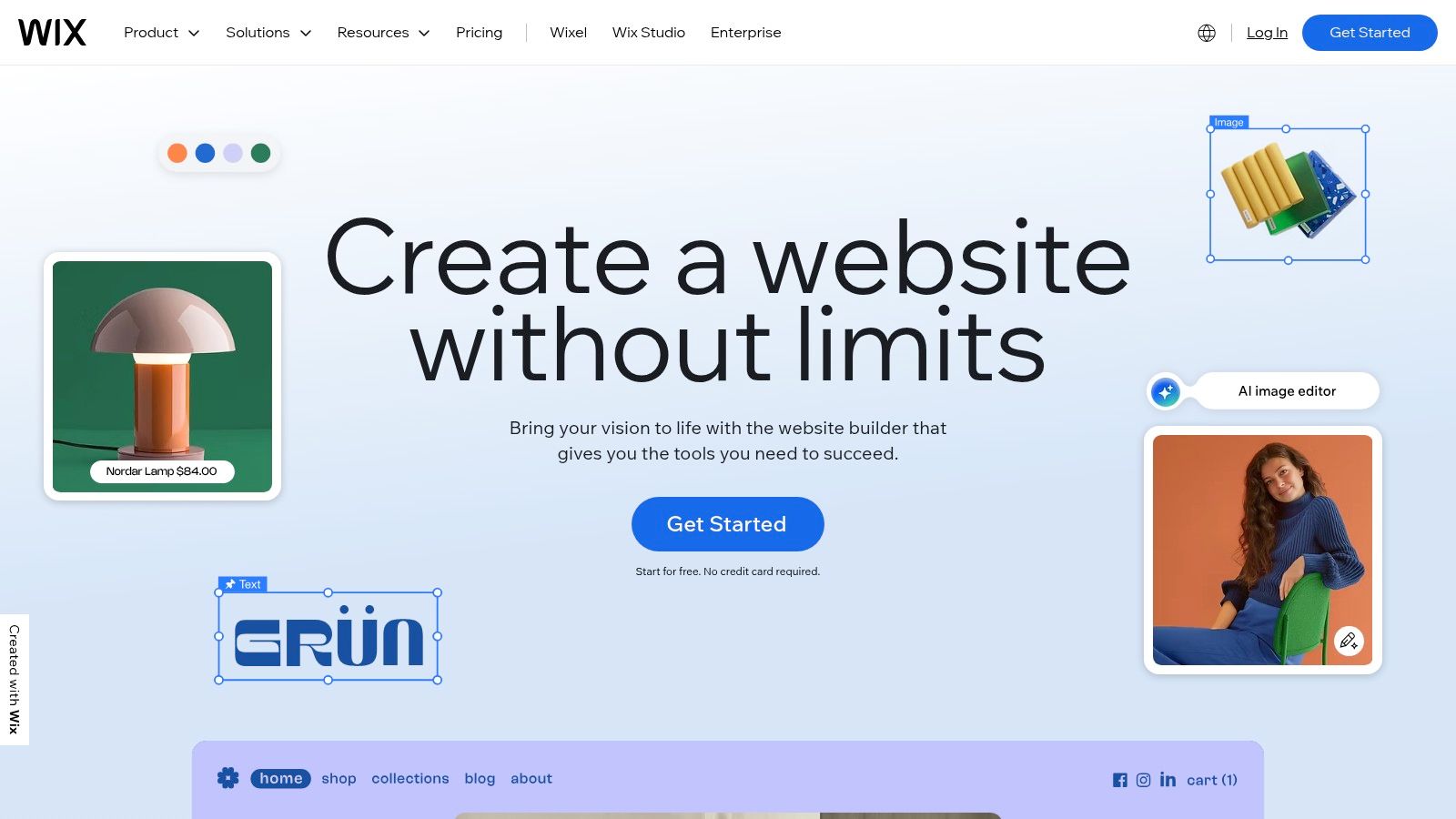
This platform excels with its vast App Market, allowing you to add advanced functionalities like event bookings, member forums, and sophisticated contact forms. For those with coding skills, Velo by Wix opens up the platform for custom web applications. The integrated ecommerce and marketing tools, including a built-in SEO assistant, are robust, providing a solid foundation for growth. For a deeper understanding of digital visibility, you can find out more about Wix SEO capabilities.
Key Details & Pricing
Best For: Beginners, creative professionals, and small to medium-sized businesses needing a high degree of customisation without coding.
Pros: Extremely intuitive editor, massive selection of templates and apps, and strong, integrated features for business, booking, and ecommerce.
Cons: You cannot switch templates after your site is live, and mobile responsiveness sometimes requires manual adjustments. Costs can rise with premium app subscriptions.
Pricing: Offers a free plan with Wix branding. Paid plans start from £9/month for the "Light" plan, with ecommerce plans beginning at £17/month.
Website: https://www.wix.com
Ready to explore its creative freedom? Visit Wix to see if it’s the right fit for your project.
2. Squarespace
Squarespace has carved out a niche as the go-to platform for creatives, portfolios, and design-conscious businesses. Its strength lies in its award-winning, visually stunning templates that are fully responsive right out of the box, ensuring your site looks exceptional on any device. Unlike more complex platforms, Squarespace integrates essential business tools like commerce, scheduling, and email marketing seamlessly into one clean dashboard, making it one of the best website builder platforms for streamlined brand management. It strikes an ideal balance between creative freedom and user-friendly operation.
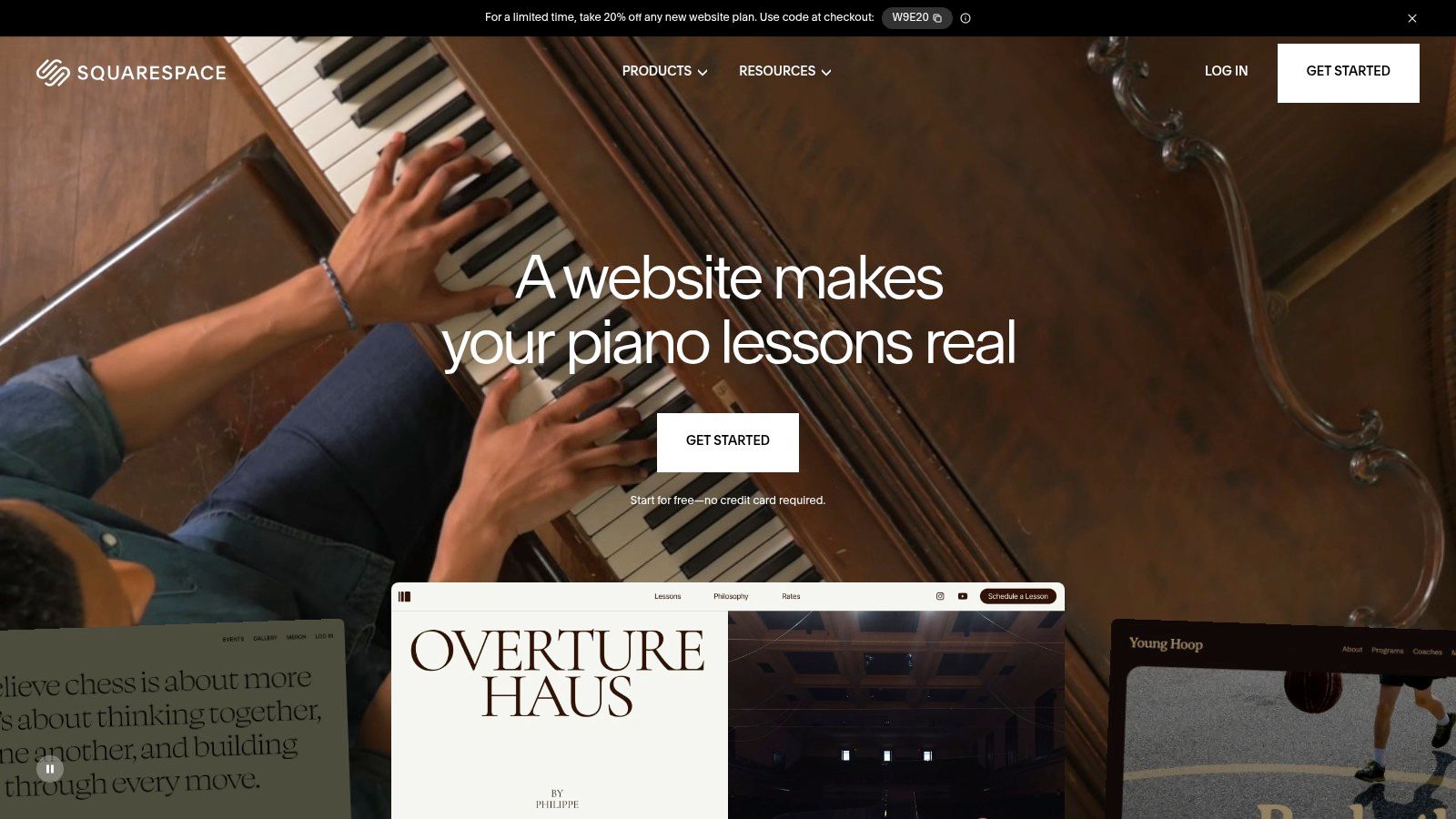
The platform is renowned for its polished, professional aesthetic and robust built-in features. You don't need a sprawling app market because powerful SEO, analytics, and marketing tools are already part of the core experience. For businesses looking to sell online, Squarespace Commerce offers sophisticated features, including point-of-sale integrations and subscription-based products on higher-tier plans. This all-in-one approach simplifies the process of building and growing an online presence without sacrificing quality or style.
Key Details & Pricing
Best For: Creative professionals, photographers, designers, and small to medium-sized businesses prioritising aesthetic quality and integrated marketing.
Pros: Exceptional design quality and ease of use, strong native marketing and analytics tools, and robust commerce features on higher-tier plans.
Cons: No permanent free plan is offered, and achieving advanced customisation may require injecting custom code.
Pricing: Begins with the "Personal" plan at £12/month (billed annually), with business and commerce plans starting from £17/month.
Website: https://www.squarespace.com
Ready to create a beautifully designed website? Visit Squarespace to start your free trial.
3. Shopify (UK)
Shopify has solidified its position as one of the best website builder platforms, but with a specific focus: ecommerce. It is a commerce-first solution designed for businesses that want to sell products online and in-person. From managing inventory across multiple locations to processing payments through its integrated system, Shopify provides a powerful, all-in-one retail management hub. Its core strength lies in its scalability, serving everyone from solo entrepreneurs launching their first product to large-scale enterprises needing enterprise-grade reliability.

The platform's true power is unlocked through its extensive App Store, which offers thousands of integrations for everything from advanced shipping logistics and marketing automation to sophisticated accounting tools. While it is less of a general-purpose website builder, for anyone serious about selling, its dedicated features like abandoned cart recovery, comprehensive analytics, and seamless checkout processes are second to none. The platform is built for growth, ensuring your online store can handle increasing demand without technical limitations.
Key Details & Pricing
Best For: Ecommerce businesses of all sizes, from startups to enterprise-level retailers, who need a robust, scalable, and dedicated sales platform.
Pros: Best-in-class retail and inventory tools, enormous app ecosystem for endless customisation, strong community support, and excellent scalability for growing businesses.
Cons: Not ideal for content-heavy sites without a sales focus. Transaction fees apply if you don't use Shopify Payments, and the cost of premium apps can add up.
Pricing: Offers a 3-day free trial. Paid plans start from £19/month for the "Basic" plan, with more advanced plans available for larger businesses.
Website: https://www.shopify.com/uk
Looking to build a powerful online store? Visit Shopify to start your free trial.
4. WordPress.com (UK)
WordPress.com offers a streamlined, hosted version of the world's most popular content management system, making it one of the best website builder platforms for content-heavy sites. It simplifies the WordPress experience by handling hosting, maintenance, and security, allowing users to focus on creating. Its strength is its powerful blogging foundation, but with higher-tier plans, it scales into a versatile builder for business sites and online stores, complete with an AI-powered site generator to kickstart the design process.
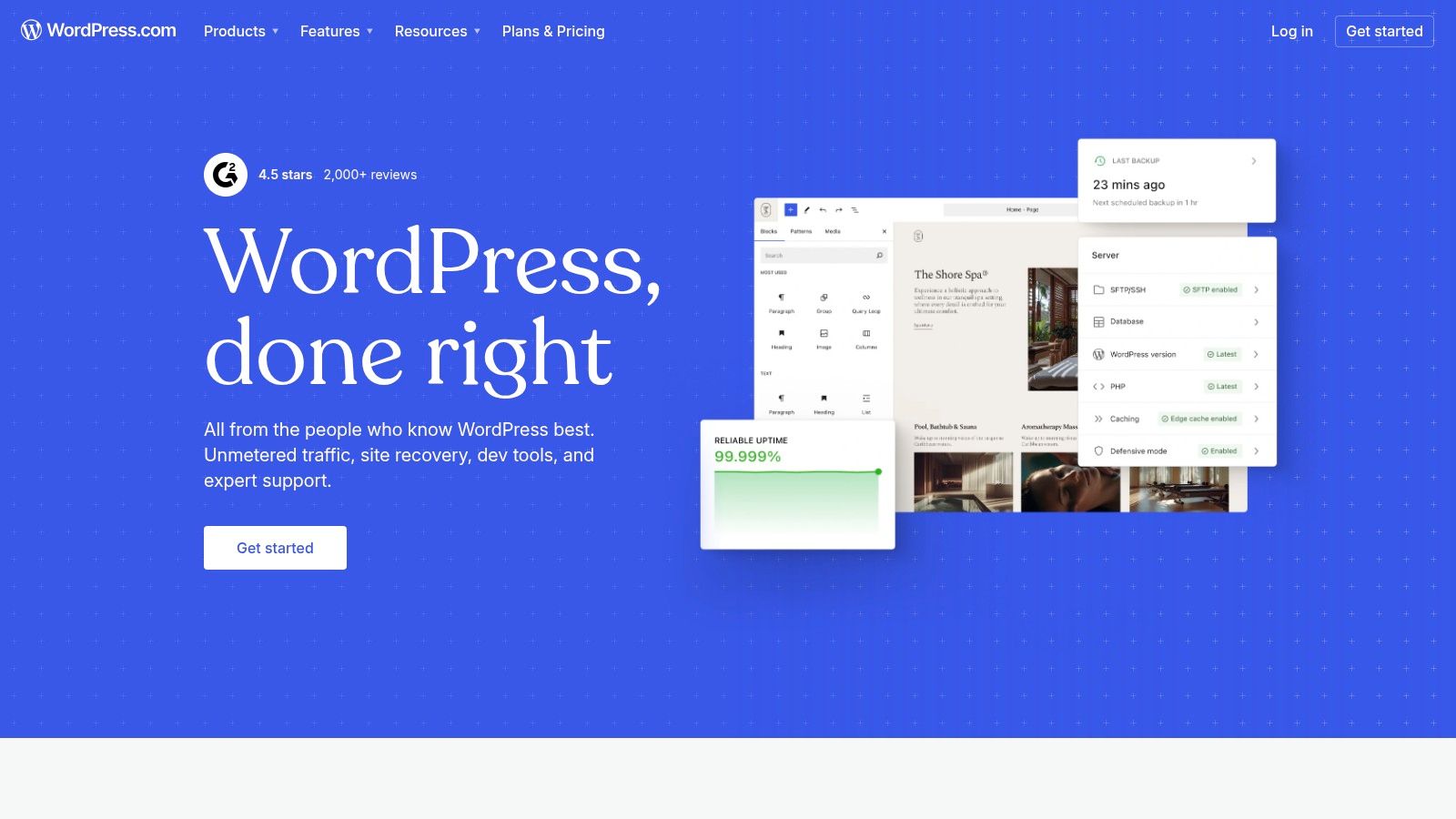
This platform provides a guided entry into the expansive WordPress ecosystem. While lower tiers are more structured, the Creator and Business+ plans unlock the ability to install custom plugins and themes, offering near-limitless functionality. This makes it an excellent choice for users who want to start simple but have the option for future growth. If you are starting from the beginning, you can learn how to design a website from scratch in the UK to make the most of the platform's features.
Key Details & Pricing
Best For: Bloggers, content creators, and businesses that prioritise a powerful CMS and want a scalable solution without managing their own hosting.
Pros: Outstanding blogging and content management features, scales from simple sites to complex stores, and provides access to the vast WordPress plugin ecosystem on higher plans.
Cons: The most powerful features (like plugins) are locked behind more expensive plans, and there's less creative freedom on the entry-level tiers.
Pricing: Offers a free plan with ads and a branded domain. Paid plans start from £4/month for "Personal", with Creator plans (for plugins) at £20/month.
Website: https://uk.wordpress.com
Explore WordPress.com today to see if its powerful content tools are the right foundation for your online presence.
5. Webflow
Webflow bridges the gap between no-code website builders and custom-coded development, making it one of the best website builder platforms for designers, agencies, and businesses demanding pixel-perfect precision. It offers a visual canvas that directly translates design decisions into clean, semantic code, giving you developer-grade control without writing a single line. This platform is built for creating complex, high-performance marketing websites with powerful interactions, animations, and a highly customisable CMS.
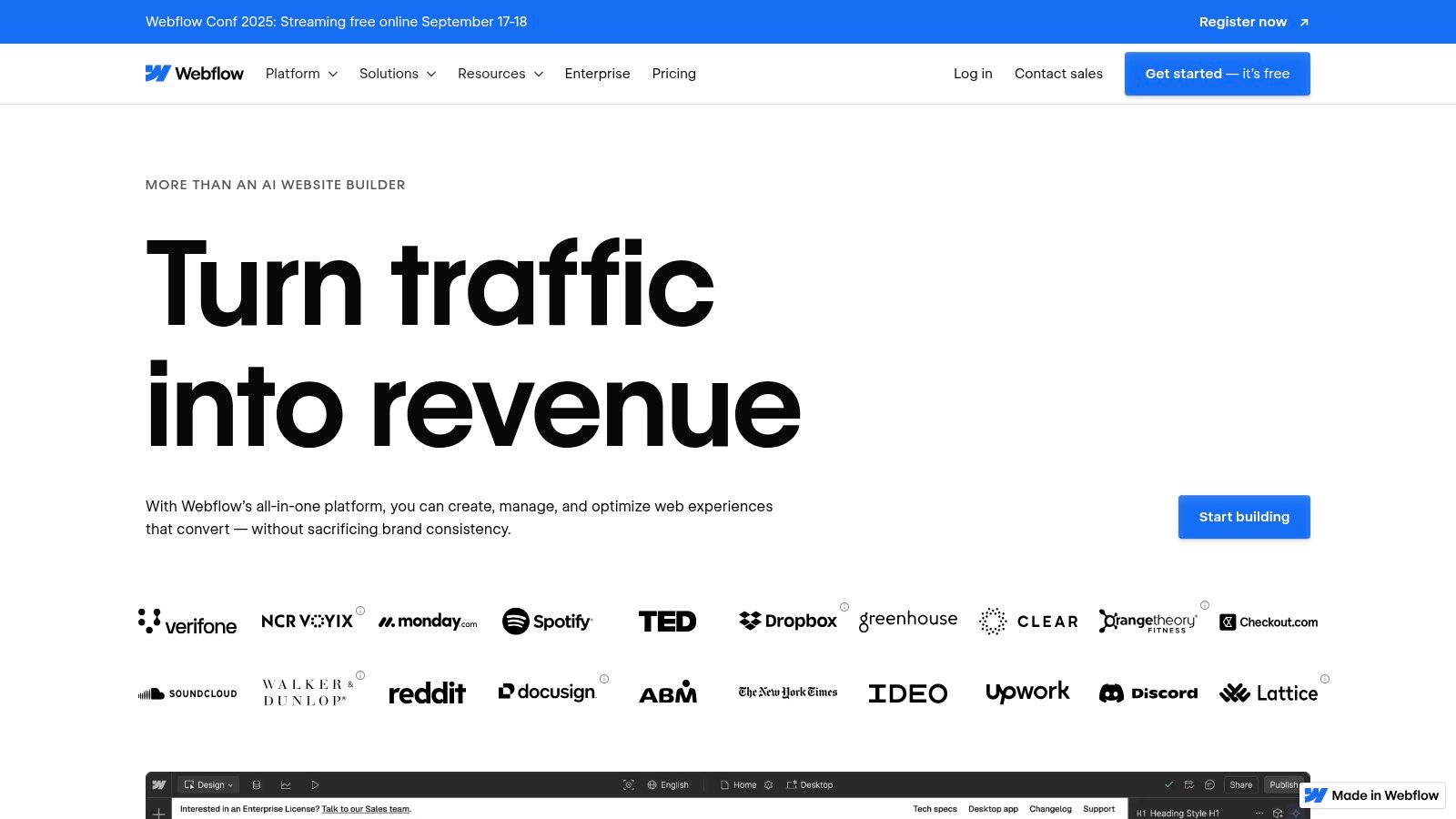
Unlike simpler drag-and-drop editors, Webflow operates on the box model principle of web design, providing unparalleled control over layout and responsiveness. Its integrated features, including a robust CMS for dynamic content, ecommerce capabilities, and new AI assistants, make it a powerhouse for professional projects. For those considering a more hands-off approach, understanding its capabilities can help you evaluate what a web design agency can offer.
Key Details & Pricing
Best For: Professional designers, agencies, and businesses needing bespoke, high-performance marketing websites with full creative control.
Pros: Unmatched design customisation, produces clean and fast code, and offers extensive learning resources through Webflow University.
Cons: Has a significant learning curve compared to beginner-friendly platforms. The pricing structure can be complex, split between site and workspace plans.
Pricing: Offers a free "Starter" plan for learning. Paid site plans start from $14/month (billed annually), with ecommerce plans from $29/month.
Website: https://webflow.com
Discover if its powerful visual development tools are right for your ambitious project by visiting Webflow today.
6. GoDaddy Website Builder (UK)
GoDaddy's Website Builder is engineered for speed and simplicity, making it one of the best website builder platforms for small business owners who need to get online fast. Its primary advantage is bundling everything a business needs- a domain, SSL certificate, hosting, and marketing tools- into one manageable package. The platform uses an AI-powered tool called Airo to generate a professional-looking site in minutes based on your industry and goals, significantly reducing the initial setup time.
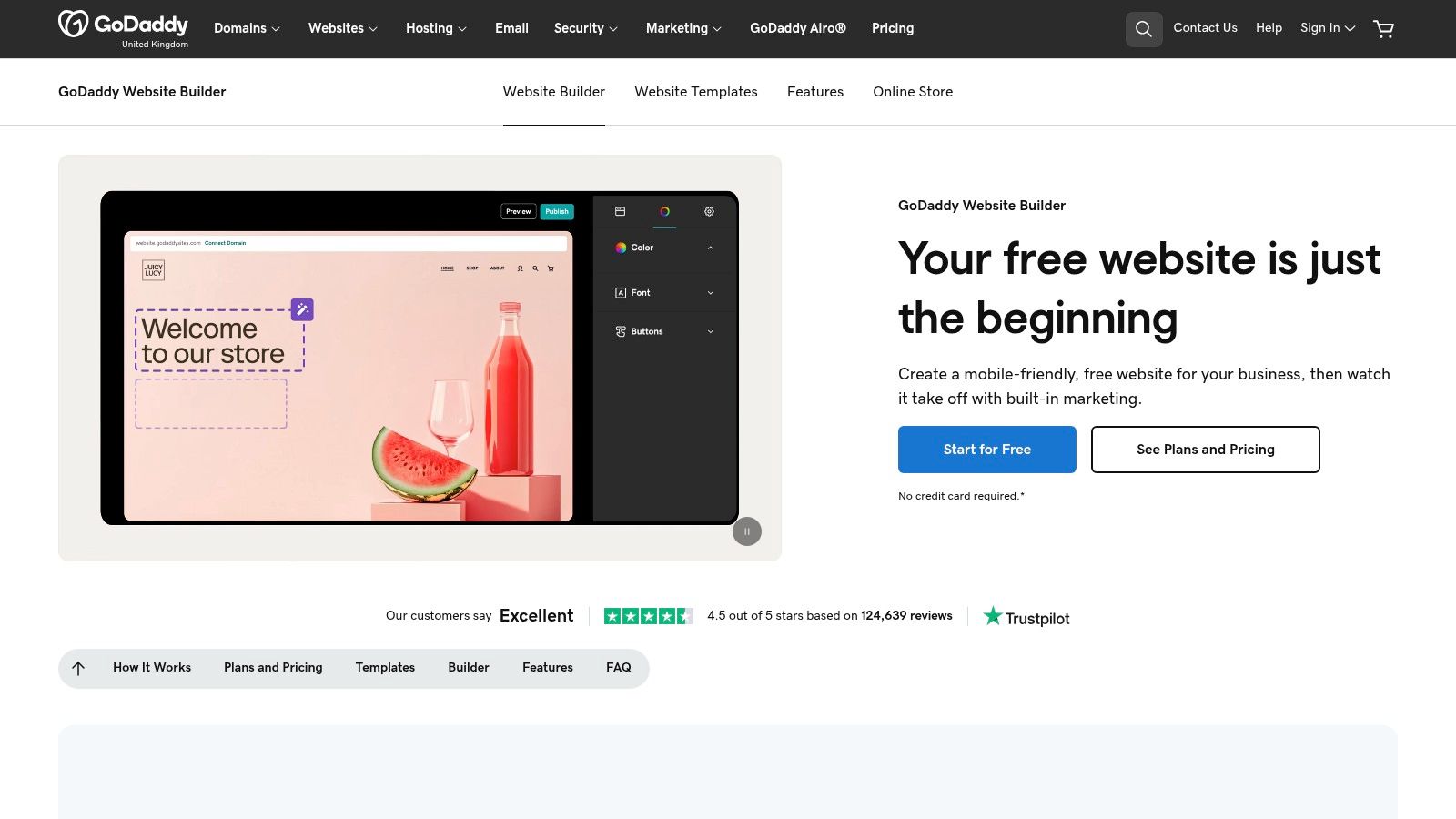
While it prioritises ease of use over deep customisation, the editor is straightforward and includes integrated tools for email marketing, social media management, and basic SEO. This all-in-one approach is ideal for service-based businesses or entrepreneurs who want to manage their entire online presence from a single dashboard without a steep learning curve. The 24/7 support is a significant benefit for those who may need assistance at any hour.
Key Details & Pricing
Best For: Small businesses, sole traders, and beginners who prioritise speed of publication and an all-in-one solution over creative freedom.
Pros: Extremely fast to publish a basic site, consolidates domain, hosting, and marketing tools with one provider, and offers strong 24/7 support.
Cons: Design flexibility is more limited than competitors, and there is no app marketplace for extending functionality. Advanced customisation is minimal.
Pricing: Plans start from £6.99/month for the "Basic" plan, with ecommerce plans beginning at £12.99/month.
Website: https://www.godaddy.com/en-uk/websites/website-builder
If you need a functional, professional website live in a hurry, visit GoDaddy to see how quickly you can get started.
7. IONOS MyWebsite (UK)
IONOS MyWebsite presents itself as a compelling, budget-conscious choice among the best website builder platforms, particularly for UK-based small businesses and sole traders. Its primary appeal is the all-inclusive starter package, bundling a free domain, a professional email address, and an SSL certificate into one low introductory price. The platform offers two routes for creation: a traditional template-based editor and an AI-powered builder that generates a customised site in minutes after you answer a few simple questions.
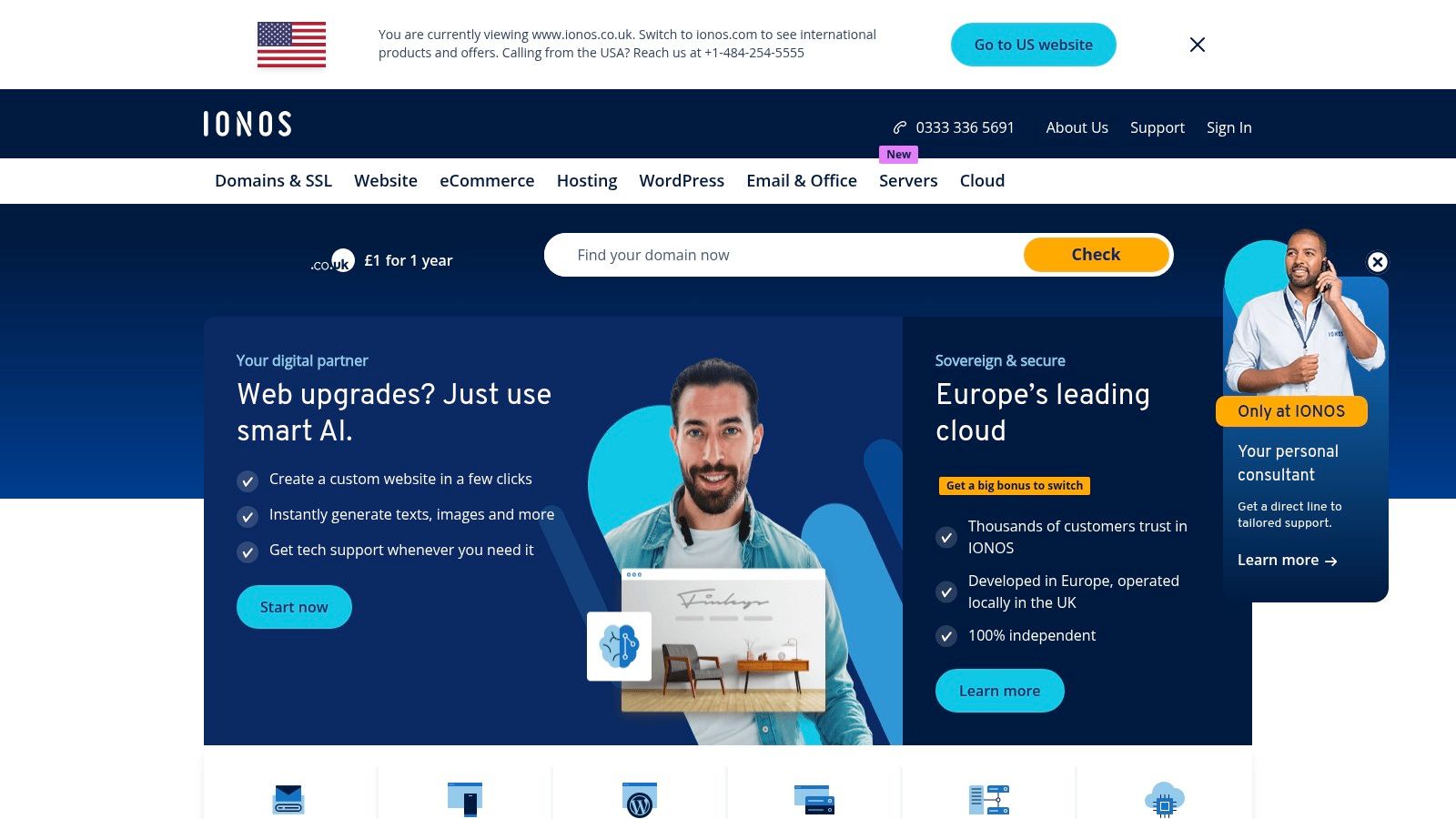
While IONOS may not offer the same depth of design flexibility as Wix or Squarespace, it excels in providing a straightforward, functional solution with excellent support. The inclusion of multilingual capabilities and robust 24/7 phone support, complete with a personal consultant, makes it a reliable partner for service-based businesses wanting to get online quickly and affordably. Ecommerce functionality is available on higher-tier plans, allowing for scalable growth.
Key Details & Pricing
Best For: Small businesses, freelancers, and beginners in the UK who prioritise affordability and all-in-one convenience over extensive design customisation.
Pros: Highly competitive introductory pricing, essential features like a domain and email are included, and strong, accessible 24/7 customer support.
Cons: The editor offers less creative freedom than top competitors, has fewer templates, and renewal prices increase significantly after the initial term.
Pricing: Offers a 30-day money-back guarantee. Plans start from an introductory price of £1/month for the "Starter" plan, with ecommerce plans beginning at £1/month for the first 6 months.
Website: https://www.ionos.co.uk
Looking for an affordable, all-inclusive package? Visit IONOS to see if its straightforward approach works for you.
8. Square Online (by Square)
Square Online emerges as one of the best website builder platforms for businesses already embedded in the Square ecosystem, especially retailers and restaurants. Its main advantage is the seamless integration between online and in-person sales. If you use Square’s POS systems, your inventory, orders, and customer data automatically synchronise, creating a unified commerce hub that simplifies operations significantly. This makes it incredibly efficient for businesses managing both a physical and digital storefront.
The platform is designed for speed and simplicity. You can launch a professional-looking online store quickly, with built-in features optimised for retail and food service, such as local delivery, click-and-collect, and QR code ordering. While it doesn't offer the deep design customisation of a builder like Wix, its focus on transactional efficiency is perfect for businesses that need to get online and start selling with minimal fuss. The setup process is straightforward, guiding users to a functional site in just a few steps.
Key Details & Pricing
Best For: Retailers, restaurants, and service-based businesses already using or planning to use Square for payments and POS.
Pros: Tight integration of in-person and online sales, quick setup ideal for food and retail businesses, and a generous free entry point.
Cons: The free plan has design and layout limitations, and there is less customisation depth compared to platforms like Shopify or Wix.
Pricing: Offers a free plan (plus transaction fees). Paid plans start from £25/month for the "Plus" plan, which removes Square branding and adds more features.
Website: https://squareup.com/gb/en/online-store
Looking to unify your online and offline sales? Visit Square Online to see how it can streamline your business.
9. BigCommerce (UK)
BigCommerce carves out its space among the best website builder platforms by focusing exclusively on serious, scalable ecommerce. It is engineered for growth, providing enterprise-level features out of the box that other platforms often require expensive apps for. This makes it an ideal choice for ambitious online stores planning to manage large product catalogues, expand into B2B sales, or sell across multiple channels like Amazon, eBay, and social media. Its core strength is its powerful backend and robust, built-in functionality.
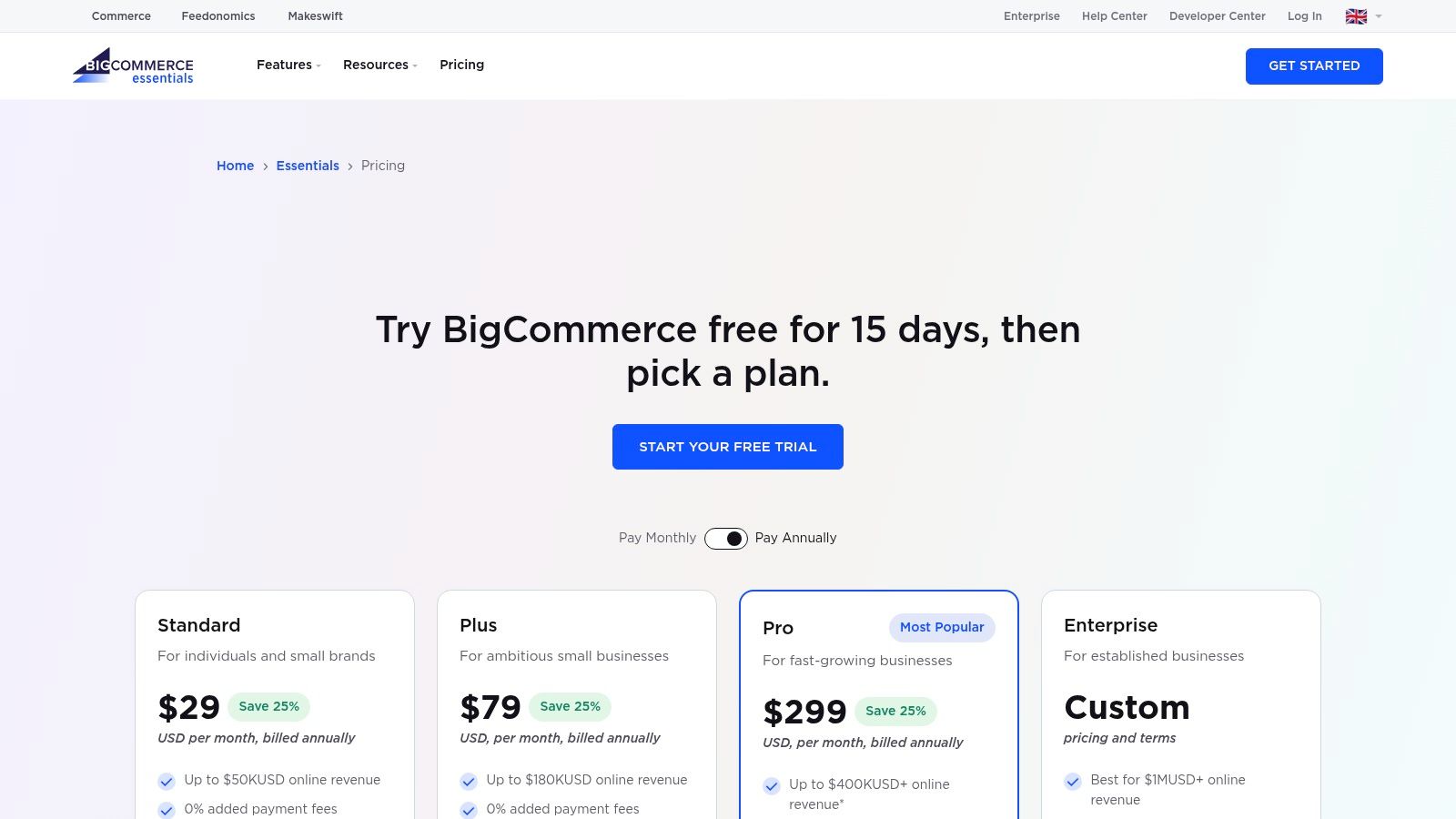
Unlike many competitors, BigCommerce charges 0% platform transaction fees on all its plans, a significant advantage for businesses with high sales volumes. The platform comes with advanced, built-in SEO features, powerful promotional tools, and a flexible API for custom integrations. While its theme editor offers less drag-and-drop freedom than visual builders like Wix, it provides a stable and highly customisable foundation for businesses that prioritise performance and scalability over complete design autonomy.
Key Details & Pricing
Best For: Fast-growing retail businesses, B2B merchants, and retailers who need powerful multi-channel selling capabilities without platform transaction fees.
Pros: Enterprise-grade features included as standard, 0% platform transaction fees, and excellent for managing large, complex product catalogues.
Cons: Less design flexibility in its theme editor compared to others, and plans have annual sales revenue thresholds that can force you to upgrade.
Pricing: Plans start from around £25/month for the "Standard" tier, with "Plus" and "Pro" plans offering more advanced features.
Website: https://www.bigcommerce.co.uk/essentials/pricing/
Check out BigCommerce to see if its powerful, growth-focused tools are right for your online store.
10. Hostinger Website Builder (UK)
Hostinger Website Builder, formerly known as Zyro, is an exceptional choice for those seeking an all-in-one package that bundles a powerful website builder with high-quality hosting. It stands out by offering a streamlined, AI-driven creation process that makes it one of the best website builder platforms for speed and efficiency. Users can leverage AI tools to generate a website, write blog content, or even create images, making it incredibly accessible for those without design or technical skills.
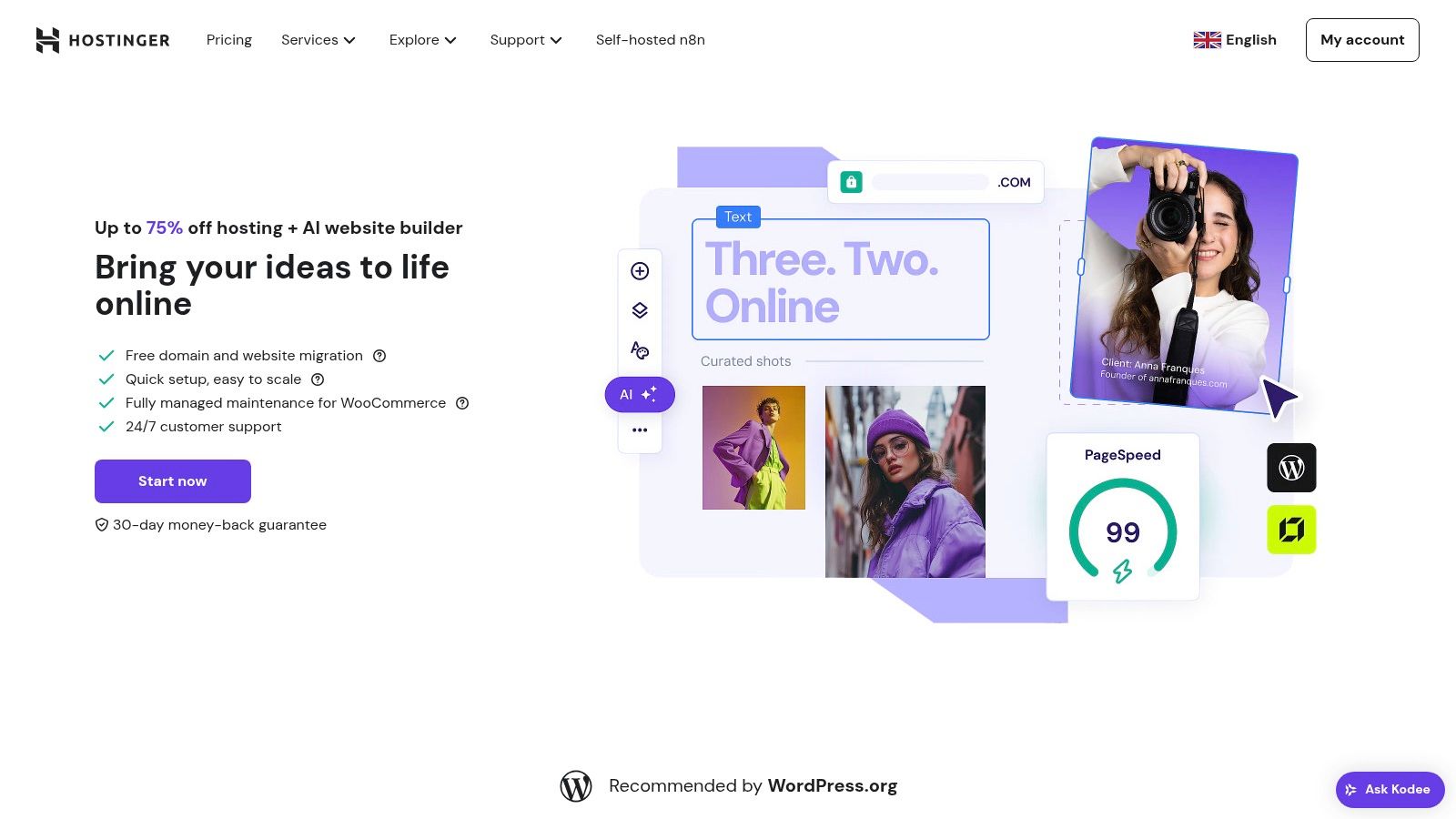
The platform is designed as a complete solution, often including a free domain for the first year, SSL certificates, and up to 100 business email accounts in its plans. This bundled approach provides immense value, especially for new businesses aiming to establish a professional online presence without managing multiple subscriptions. Its transparent long-term promotional pricing is a major draw, offering significant savings for those willing to commit to a longer plan upfront.
Key Details & Pricing
Best For: Small businesses, entrepreneurs, and individuals looking for a highly affordable, all-inclusive package that combines web hosting and an easy-to-use AI builder.
Pros: Extremely affordable introductory pricing on longer plans, rapid site creation with AI assistance, and great value with bundled hosting, domain, and email.
Cons: No permanent free plan is available, and renewal prices are significantly higher than the initial promotional rates.
Pricing: Plans frequently start with promotional pricing around £2.59/month, which includes the website builder and hosting. Standard rates apply upon renewal.
Website: https://www.hostinger.co.uk/website-builder
Looking for an affordable, AI-powered start? Visit Hostinger to see if its all-in-one package is right for you.
11. Duda
Duda is a professional-grade website builder platform designed specifically for digital agencies, freelancers, and hosting companies. Its core strength lies in its powerful client management and collaboration tools, which allow professionals to build and manage multiple websites at scale. The platform is fully white-label, meaning agencies can brand the builder as their own, providing a seamless experience for their clients from login to the final website handover.
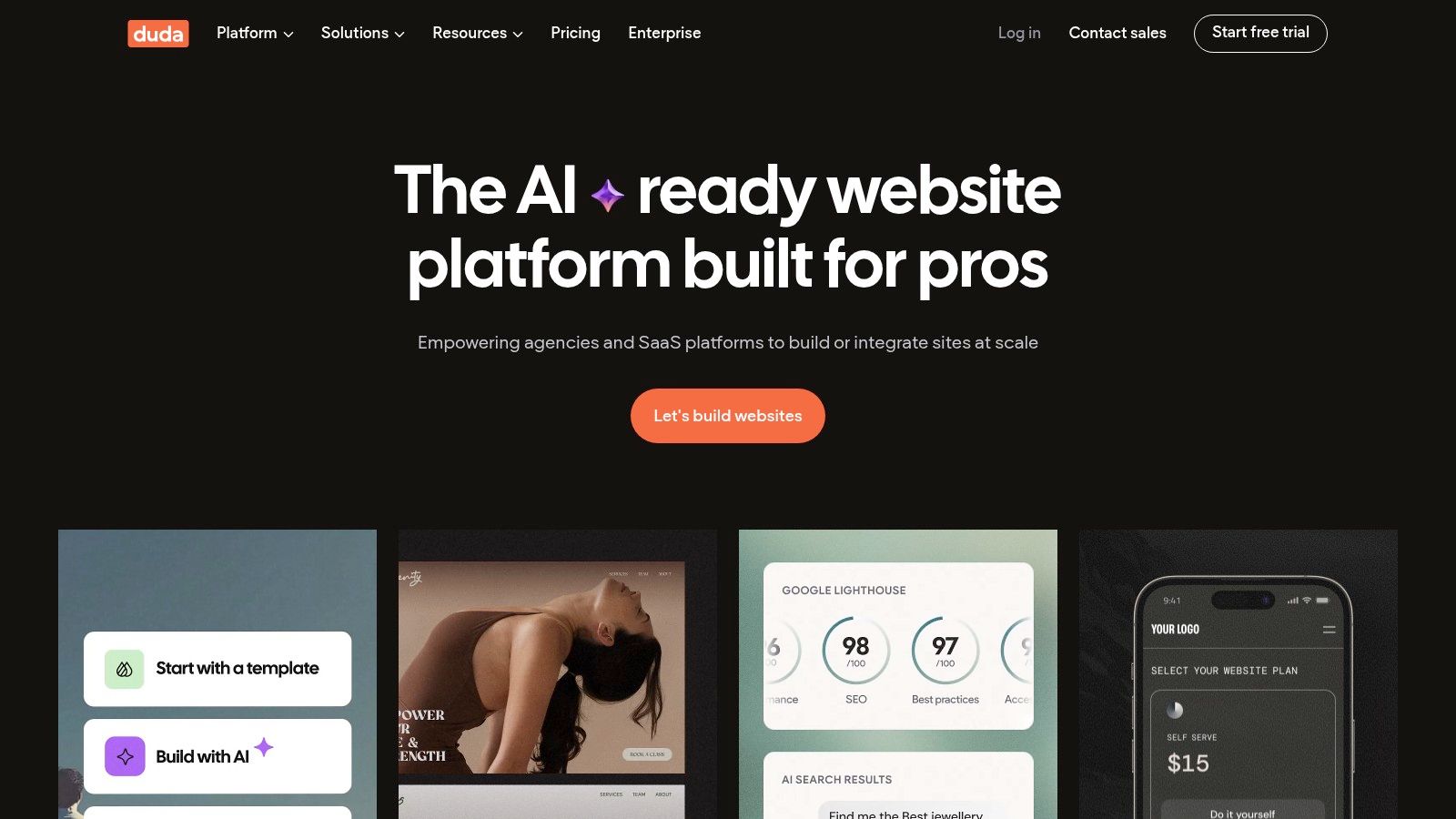
This platform excels with its focus on performance and structure, leveraging AWS hosting for excellent uptime and speed. Features like dynamic pages connected to content libraries, team permissions, and site comments streamline the workflow for creating complex, content-rich sites. Duda also integrates powerful tools like multilingual site creation and an AI assistant for content and SEO, making it one of the best website builder platforms for professionals who prioritise efficiency and client satisfaction.
Key Details & Pricing
Best For: Web design agencies, freelancers, and SaaS platforms needing a scalable, white-label solution to build client websites efficiently.
Pros: Built for agencies managing multiple client sites, strong performance with reliable AWS hosting, and advanced collaboration and workflow tools.
Cons: More expensive than consumer-focused website builders, and there is no permanent free tier, only a limited trial is available.
Pricing: Plans start from the "Basic" plan at $25/month, with the "Team" plan offering more collaboration features at $52/month.
Website: https://www.duda.co
Check out Duda to see how it can streamline your agency's web design process.
12. Fasthosts Website Builder (UK)
Fasthosts offers a straightforward and budget-friendly entry into the world of website creation, making it a strong contender among the best website builder platforms for UK-based users. Its main appeal is the value-packed bundle it provides, which includes a free domain name, an SSL certificate, and a professional email address right from the start. This all-in-one approach simplifies the technical setup, allowing small businesses and individuals to establish a professional online presence without hassle.
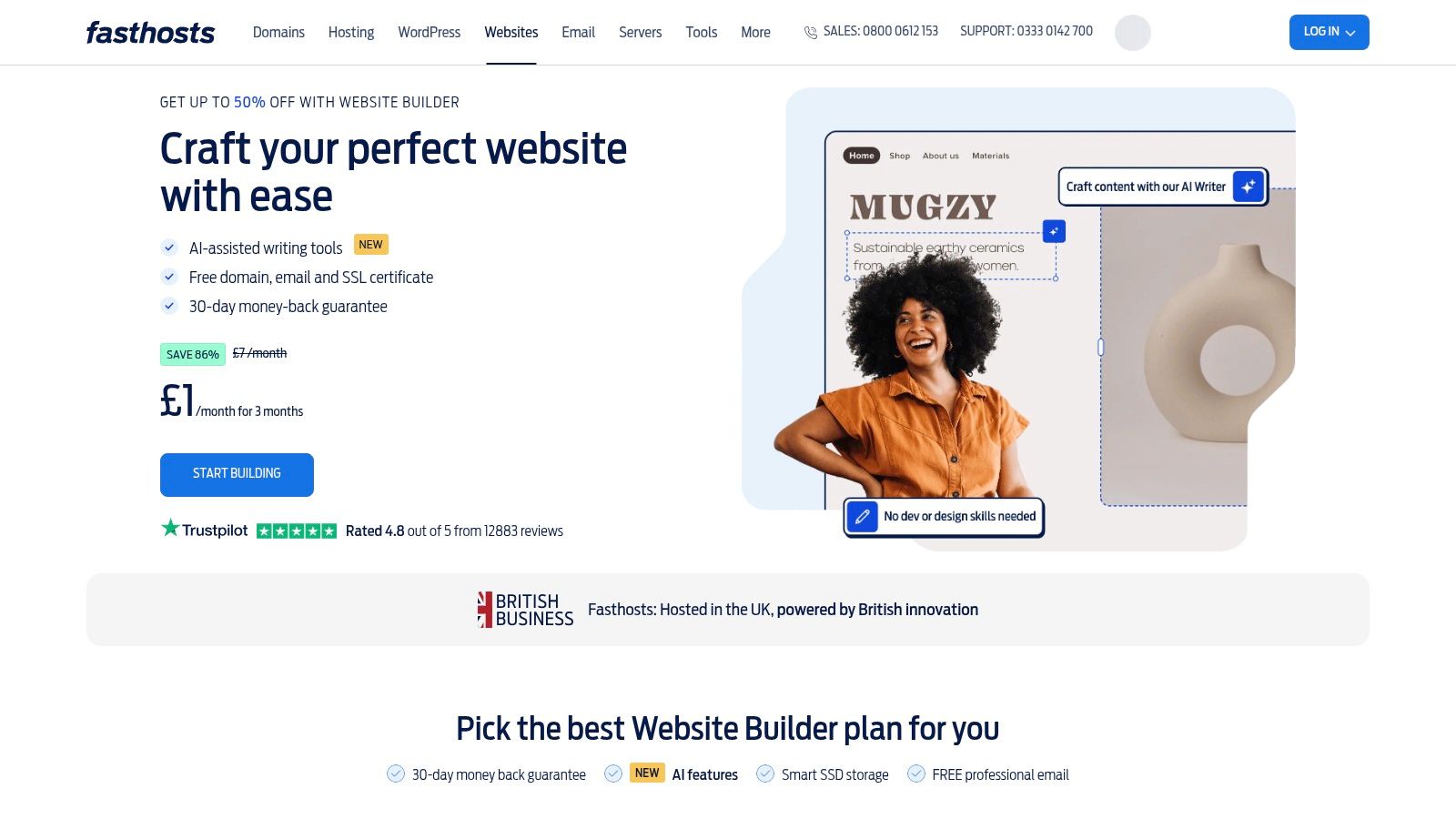
The platform integrates modern tools like an AI Writer to help generate content and offers basic SEO and image optimisation features to improve visibility. While it may not have the extensive template library or advanced customisation options of larger international rivals, its strength lies in its simplicity and excellent local support. The 30-day no-obligation trial and money-back guarantee provide a risk-free way to test its capabilities, making it ideal for those who prioritise ease of use and affordability.
Key Details & Pricing
Best For: UK-based small businesses, sole traders, and beginners looking for an affordable, all-inclusive package with local support.
Pros: Very low introductory pricing, complete starter bundle including domain, SSL, and email, and good, responsive UK-based customer service.
Cons: Fewer templates and third-party integrations compared to market leaders, and the depth of customisation and features is more basic.
Pricing: Introductory offers often start from £1 for the first 3 months. Standard plans are competitively priced, with ecommerce upgrades available.
Website: https://www.fasthosts.co.uk/website-builder.html
Looking for a simple, UK-focused solution? Check out Fasthosts to see if its value-driven approach is right for you.
Top 12 Website Builders Feature Comparison
Platform | Core Features / ✨ Unique Selling Points | User Experience / ★ Rating | Value Proposition / 💰 Pricing | Target Audience / 👥 | Excellence / 🏆 Highlights |
|---|---|---|---|---|---|
Wix | Drag-and-drop editor, 900+ templates, ecommerce & booking, AI setup ✨ | ★★★★☆ Beginner-friendly | 💰 Moderate, costs grow with apps | 👥 Beginners, small to large | 🏆 Huge app marketplace & scalability |
Squarespace | Award-winning design, built-in SEO/analytics, commerce, email marketing ✨ | ★★★★☆ Design-focused ease of use | 💰 Mid-tier with frequent discounts | 👥 SMEs, creatives | 🏆 Excellent design & native marketing tools |
Shopify (UK) | Retail-first, multi-store, Shopify Payments, vast app ecosystem ✨ | ★★★★★ Robust & scalable | 💰 Higher, app add-ons extra | 👥 Small to enterprise | 🏆 Best-in-class retail tooling |
WordPress.com (UK) | Hosted WP, plugins/themes, AI builder, blogging & ecommerce ✨ | ★★★★☆ Highly flexible | 💰 Varied; limited on lower tiers | 👥 Bloggers to businesses | 🏆 Huge ecosystem & CMS features |
Webflow | Pixel-precise design, robust CMS, AI assistants, secure hosting ✨ | ★★★�★☆ Professional-grade control | 💰 Premium pricing | 👥 Designers, agencies | 🏆 Developer-level control without coding |
GoDaddy Website Builder | AI-assisted quick build, all-in-one hosting/domain/SSL, ecommerce support ✨ | ★★★☆☆ Fast setup but limited UX | 💰 Affordable, fewer apps | 👥 Small businesses | 🏆 One-stop solution with strong support |
IONOS MyWebsite (UK) | AI design, free 1st year domain/SSL/email, ecommerce add-ons ✨ | ★★★☆☆ Basic customization | 💰 Budget-friendly intro pricing | 👥 Cost-conscious UK users | 🏆 Strong phone support & bundled essentials |
Square Online (by Square) | Free starter, POS sync, subscriptions, QR ordering, clear UK fees ✨ | ★★★☆☆ Easy start, limited layouts | 💰 Free plan available | 👥 Restaurants, retailers | 🏆 Tight online & in-person sales integration |
BigCommerce (UK) | Multi-channel sales, no platform fees, SEO/promos, B2B tools ✨ | ★★★★☆ Enterprise-capable | 💰 Scales with revenue | 👥 Growing ecommerce stores | 🏆 No transaction fees, robust API |
Hostinger Website Builder (UK) | AI-driven builder, free domain 1st year, SSL, ecommerce support ✨ | ★★★☆☆ Affordable & quick launch | 💰 Very affordable on long terms | 👥 Budget users & starters | 🏆 Bundled hosting + builder value |
Duda | White-label, client portals, AI SEO, AWS hosting, collaboration tools ✨ | ★★★★☆ Agency-grade workflow | 💰 Premium, agency-focused | 👥 Agencies, freelancers | 🏆 Strong collaboration & performance |
Fasthosts Website Builder (UK) | AI tools, domain/SSL/email included, ecommerce ready, UK support ✨ | ★★★☆☆ Basic and local support | 💰 Very low intro pricing | 👥 UK users seeking value | 🏆 Local support with good starter bundle |
Final Thoughts
Navigating the crowded market of the best website builder platforms can feel overwhelming, but the journey to establishing your online presence is now clearer. We’ve explored a diverse landscape of tools, from the intuitive drag-and-drop simplicity of Wix and the elegant design focus of Squarespace to the e-commerce powerhouses of Shopify and BigCommerce. Each platform serves a distinct purpose, tailored to different ambitions, budgets, and technical comfort levels.
The key takeaway is that there is no single "best" platform for everyone. The right choice is deeply personal and strategic, hinging entirely on your specific goals. An aspiring blogger has vastly different needs from a burgeoning online retailer, just as a freelance designer requiring a sophisticated portfolio will prioritise features differently from a local service business needing a simple, professional online brochure.
How to Choose Your Ideal Platform
Before you commit, take a moment to crystallise your objectives. A structured approach will prevent future frustration and ensure you select a platform that can grow with you.
Consider these critical factors:
Primary Goal: Is your main objective to sell products (e-commerce), showcase a portfolio, generate leads, or publish content? Your answer will immediately narrow down the top contenders. For instance, if online sales are your lifeblood, platforms like Shopify or BigCommerce are built from the ground up to support that, whereas a visual artist might find Squarespace’s templates a more natural fit.
Scalability: Think about where you want your project to be in two to five years. While a simple builder like GoDaddy might suffice for now, will you need advanced marketing integrations, membership functionalities, or extensive product customisation later on? Platforms like WordPress.com and Webflow offer a much higher ceiling for future growth and complexity.
Budget: Your budget encompasses more than just the monthly subscription fee. Factor in potential costs for premium themes, essential apps or plugins, and transaction fees for e-commerce platforms. Always read the pricing tiers carefully to understand what is included and what will be an additional expense as you expand.
Time and Technical Skill: Be honest about the time you can dedicate to building and maintaining your site. All-in-one solutions like Hostinger or IONOS are designed for rapid deployment with minimal fuss. In contrast, a platform like Webflow provides immense creative control but demands a greater investment in learning its more complex interface.
Ultimately, choosing from the best website builder platforms is the first major step in building your digital home. It's less about finding a perfect tool and more about finding the right tool for your unique journey. Use the free trials offered by most providers to experiment. Test the user interface, explore the features that matter most to you, and see which one feels like the most natural partner for your brand. Your perfect platform is out there, waiting to help you bring your vision to life.
Feeling overwhelmed by the options or need a professional touch to bring your vision to life? At Baslon Digital, we specialise in creating custom, high-performing websites using the industry's leading platforms. Let us handle the technical complexities so you can focus on your business by visiting us at Baslon Digital today.
Article created using [Outrank](https://outrank.so)

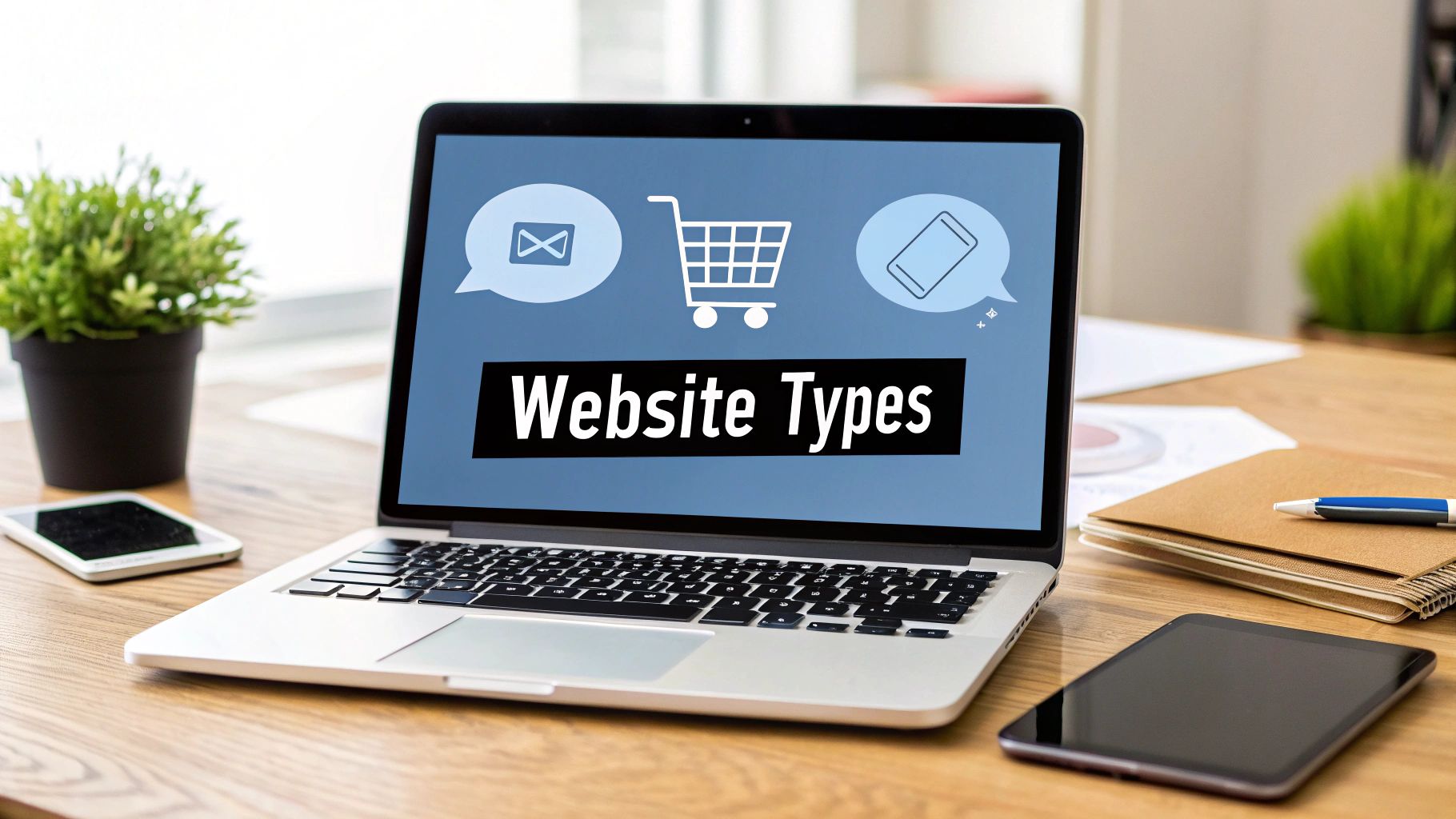

Transform your spacious living room today! Why wait? You can quickly and securely purchase 6 seater sofa set and other premium furniture when you choose to buy sofa set online from Abhi and Oak. Get the perfect sectional or modular set for family, friends, and maximum comfort, delivered straight to your door. Shop our collection now for great styles and hassle-free online ordering!